Best Virtual Machine Managers for 2017
Whatever you need, one of these eight control panels should have you covered. We’ve got a mix of commercial and open-source options geared for small or large hosts. From industry veterans, like VMware, to newcomers like Virtkick, these virtual machine managers are ready to serve you.
SolusVM
One of the most popular control panels around, SolusVM lets companies large and small manage virtual machines from one central user interface with security and ease. The SolusVM portal tailors different interfaces for administrators, resellers, and users, making it a breeze to boot, reboot, shut down, suspend, or unsuspend virtual machines.
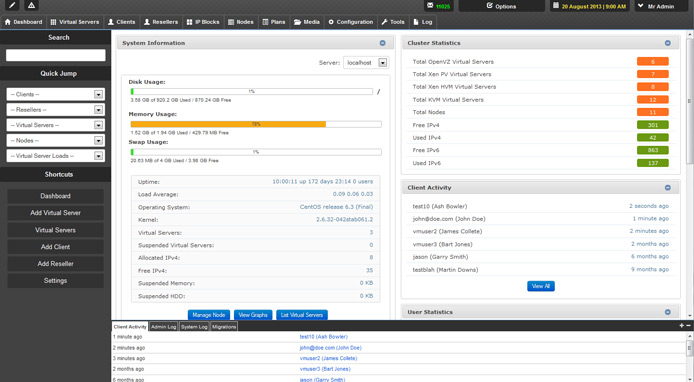
SolusVM is a feature-packed, affordable management panel that appeals to companies of all sizes.
Beyond the bevy of features, SolusVM is a cost-effective VPS manager. In addition to a handy — and free — 30-day trial, licenses are very reasonable: $10 per month gets you one OpenVZ master and supplemental slave nodes cost between $2.50 and $10 each, depending on how many machines you create. You also get 24/7 support and a 10% discount for annual payments. If you don’t need to virtualize your master, the Slave Only Master plan costs $2.50 per month.
VMware vSphere
A leading platform for server virtualization and building cloud infrastructure, VMware vSphere is an ideal, state-of-the-art solution for enterprises and large VPS providers. You’ll pay a premium — a basic, 1-year subscription with support costs $273 each year — but vSphere serves up streamlined automation, comprehensive security, a universal app platform, along with improved visibility, availability, and capacity utilization.

The vSphere portal comes with the backing of virtualization giant VMware.
Although vSphere integrates well with many billing systems, your virtualization options are a bit limited. VMware wants users to manage their vSphere environments with their proprietary hypervisor, but you can extend the platform to allow for the management of third-party tools.
VMmanager
ISPsystem is gaining global traction with their Linux-based management panel VMmanager. The customer-focused platform is a model of flexibility, offering bargain-priced 1-month or 1-year plans in addition to lifetime licenses and a free version that won’t expire. The free download and installation allows users to create two virtual machines, five nodes, and use 16GB of RAM — letting you focus on your business rather than the expenses.
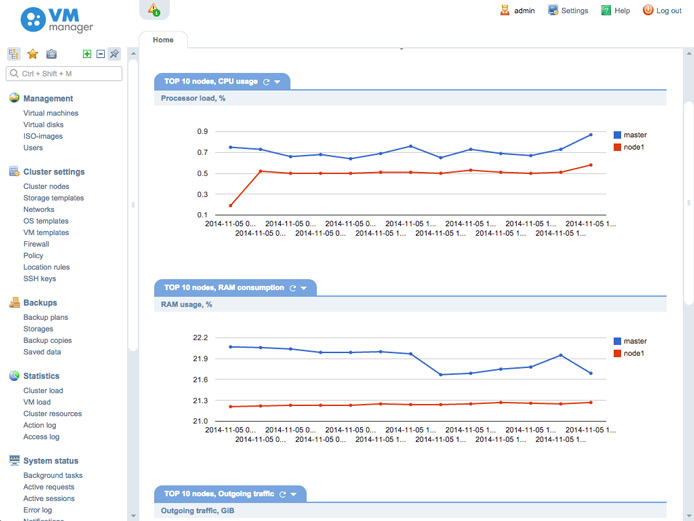
ISPsystem built VMmanager to appeal to global customers’ needs for flexibility and cost-effectiveness.
VMmanager is developed in C++ and one of the most comprehensive software kits for hosting automation. It already supports KVM and OpenVZ hypervisors, but the developers behind VMmanager recently announced support for additional hypervisors will be available in early 2017.
Virtualizor
The most flexible management platform, Virtualizor simplifies and streamlines VPS administration for small or medium businesses. In addition to running any hypervisor, Virtualizor offers several virtual machine templates to speed up operating system deployment. The free 1-month license gives potential customers ample opportunity to test Virtualizor’s streamlined interface.
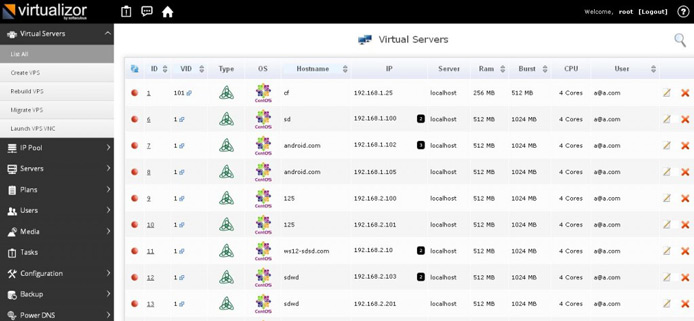
Virtualizor blends open-source and commercial solutions to provide the most virtualization and billing options.
Every action in Virtualizor has an API call, which you can use to manage anything in the management panel. Virtualizor supports the API calls in JSON, XML, and PHP serialized formats. Open-source modules for WHMCS and Blesta simplify the integration with billing systems — users can perform operations on their virtual machines without logging into Virtualizor or automatically create virtual machines as soon as payment is received.
Xen Orchestra
An open-source interface, Xen Orchestra seamlessly transforms XenServer infrastructure into a flexible cloud solution. With Xen Orchestra Appliance, a turnkey solution to deploy Orchestra, users can get straight to work without worrying about installation agents. The platform connects all your XenServer pools to provide a complete overview of your entire infrastructure.
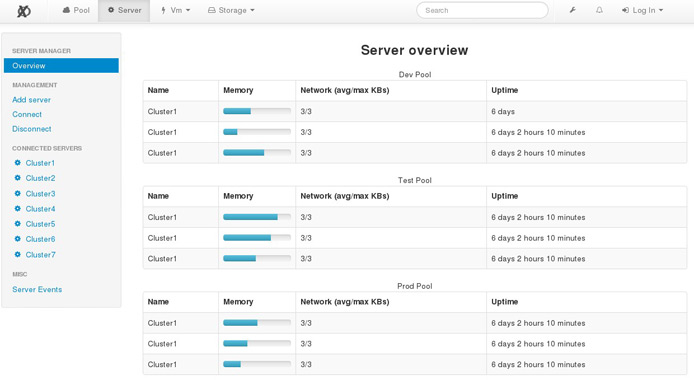
Open-source option Xen Orchestra seamlessly virtualizes XenServers with a powerful and simple interface.
Xen Orchestra’s powerful and simple interface enables customers to save costs by operating and delegating their own hardware. Paid subscriptions, which range from $70 to $500 monthly, allow customers to vote for future features.
Archipel
What’s better than free? Archipel, an XMPP-based orchestrator, is an open-source download available to all. The nonexistent price tag is especially appealing to startups or individual developers wanting to run a few local virtual machines, but you can use Archipel to supervise and manage VPS systems in different datacenters.
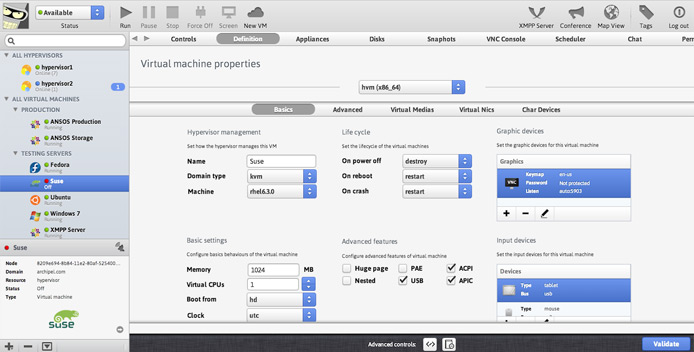
Archipel’s XMPP-based platform lets you chat with your virtual machines — really.
By using XMPP for all communications, Archipel doesn’t need a web service or custom protocol. With one XMPP server (Archipel recommends eJabberd), you’ll never have to refresh the user interface. You can even command your infrastructure through a chat client — yes, you can ask your virtual machine how it’s doing or to please reboot.
Proxmox Virtual Environment
Another open-source solution, Proxmox offers the Virtual Environment software for free, but paid subscriptions are the only way to access support services, platform updates, additional components, and security enhancements. Plans cost between about $6 and $70 per CPU. Proxmox can be installed on bare servers through a USB or CD, which will automatically deploy a Debian operating system with Proxmox already integrated.
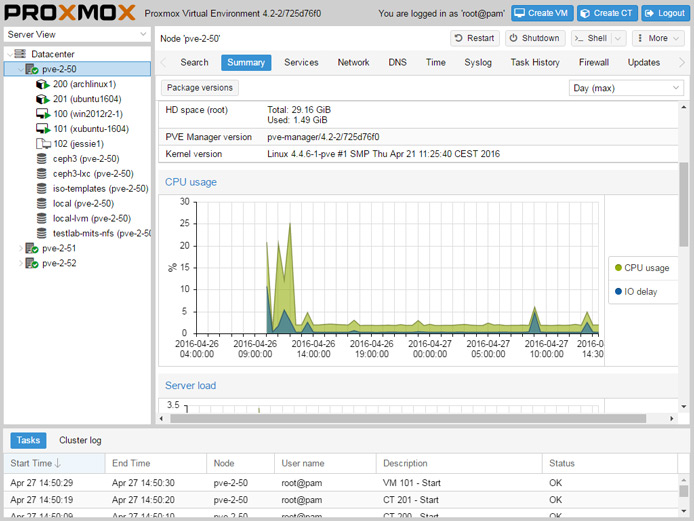
Proxmox Virtual Environment mixes free, open-source software with paid technical support and training courses.
Although you have to pay for most technical support, Proxmox does provide several training courses and tutorials to get you or your team up to speed with implementing and operating Proxmox. Employees host training sessions in Austria, but authorized training partners hold the courses in France, Germany, and the US.
Virtkick
The newest of our bunch, Virtkick is a modern, all-in-one platform that entered the market in 2014. Virtkick combines billing software and VPS management tools in a minimalistic and extremely easy-to-use interface. As a young company themselves, Virtkick is best for more flexible startups, small datacenters, and game hosts.
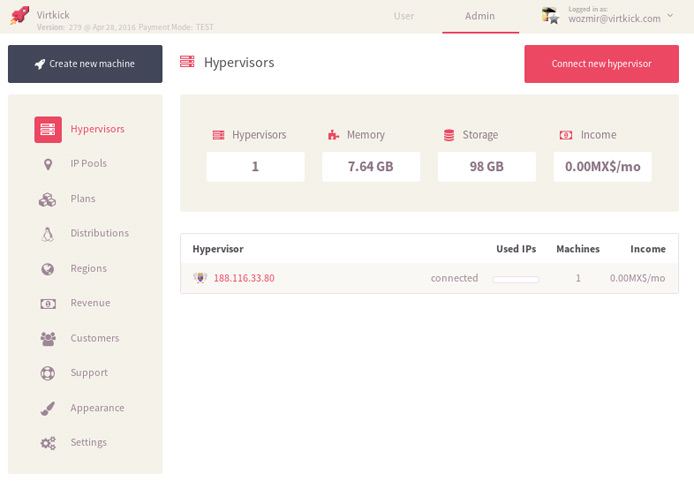
Virtkick’s sleek, minimalist interface puts a SaaS spin on VPS management.
Virtkick takes a SaaS-based approach, which frees you up to focus on VPS sales instead of messing with the program and hardware. The company’s team manages your control panel’s software updates, security upgrades, and development. With higher-tier subscriptions, Virtkick customers can fully white label the platform on a custom domain.






